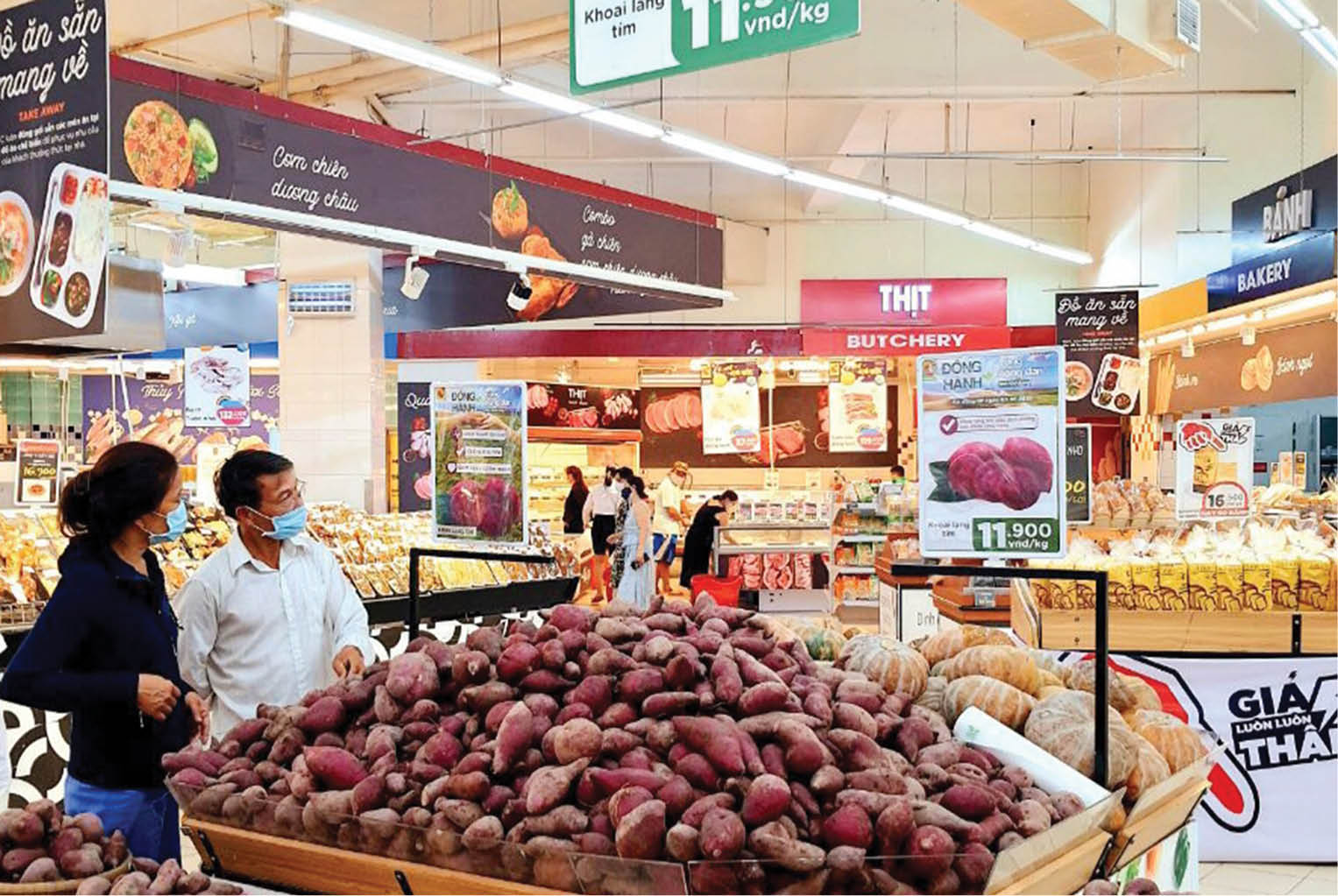
Mr. Nguyen Thanh, Director of Department of Industry and Trade. Photo: Duc Quang
How is our current state of the essential good supply? Does it meet the needs of the people, Sir?
With a large number of citizens returning to the city from the pandemic areas, the Provincial People's Committee has directed to establish a logistics working group which is in charge of departments and agencies to serve well the isolation areas as well as the needs of people in the process of pandemic prevention and control. Particularly, the industry and trade sector has planned to supply essential goods to ensure people's lives.
In the isolation areas currently in charge of the army and local forces, the department regularly works with the provincial Military Commands and local areas on daily food supply. Now, the supply of goods from supermarkets and retail businesses is relatively abundant, ensuring the daily meal preparation for citizens.
.jpeg)
Supermarkets are committed to ensuring enough supply of goods to consumers. Photo: Phuong Ngoc
For residential areas, although the city has not yet implemented the social distance, amid the complicated development of the epidemic, the province advised people to limit their travel and localities to prioritize using on-site goods. This is because for a long time, all localities have had small-scale production which partly met the local people's needs, and large markets and supermarkets provided the rest. Among these, the Phu Hau market is a wholesale market that supplies goods daily to localities in large quantities, so there is no lack of goods supplies. Previously, we had two localities, including Phu Loc and Phong Dien, implemented the social distance, yet the supply of goods was still guaranteed.
Amid the complex situation of the pandemic, some citizens are so worried that they bought food to stock up. Will this lead to shortages and price increases?
Yes, there is a situation that people buy goods to stock, which is a legitimate behavior; therefore, it needs to be appropriately understood and adjusted. The important thing is how to manage and arrange the consumption and a reasonable sales volume to avoid market fluctuations. Facing this situation, the province has directed the department to strengthen functional forces to examine and control the market, strictly handle cases of speculation, hoarding goods to raise prices.

Essential goods and food at Hue Big C Supermarket are always guaranteed
Recently, there was a shortage of goods locally in the urgent period due to the increased daily consumption, or the supermarkets could not supply in time, causing confusion, but in fact, there was no shortage of goods.
Specifically, there was a situation that there were products with different brands; however, consumers only chose to buy one certain brand, leading to temporary scarcity, while other brands of the same product are still abundant, so it is hoped that citizens who shop during the epidemic should not buy in large quantities to hoard as this will cause market fluctuations.
The reason for this is that the industry and trade sector has planned that if shopping centers and markets have F0, the supply of goods is still guaranteed for the society's consumption needs.
Can you be more specific?
Now, markets and supermarkets have stockpiled supplies, developed all scenarios once the social distance is implemented when there are new cases, and constructed a plan to arrange a backup workforce to replace when the workforce is quarantined.
In addition, the units have arranged backup sale points outside the supermarket to sell goods and carry out disinfection spraying to ensure safe circulation of goods, prioritizing essential items.
To ensure customers' safety when implementing social distancing, the department directs supermarkets and markets to conduct sales in the form of "even-odd" days and distribute tickets. In every situation, markets and supermarkets must be viewed as "hospitals," so it is not possible to close all supermarkets.
If markets and supermarkets are considered as "hospitals" and cannot be closed, can you tell us how the pandemic prevention and control plan is implemented?
Markets and supermarkets are the places with a high risk of infection because of frequent contact with customers. Although the units implement strict epidemic prevention and control, it is quite impossible to guarantee absolute safety.
Recently, the department has advised the province to vaccinate the staff working in supermarkets and markets, and the province has given priority for these units. Currently, the sales team of supermarkets has basically been vaccinated; meanwhile, the markets are still conducting this. However, due to the limited vaccine source, the markets are still implementing the injection according to the schedule. Therefore, the sectors have arranged to give the vaccinated force to serve the frontline, and the rest would be a backup ones in case of shortage of human resources.
In case of emergency, supermarkets will dispatch staff from suppliers in localities with no local pandemic to replace their own staff to ensure that the supermarkets remain open and circulate goods to consumers in all situations.
With the worst scenario, there is an outbreak of pandemic in Hue again; how does the industry and trade sector develop measures and plans to supply goods?
When there is a case that the whole province implements the social distance according to Directives 15 and 16 of the Prime Minister and the movements of the people is limited, the industry and trade sector requires retail units to prepare a team of shippers ready to transport goods to localities to serve people, while supermarket staff (who have been vaccinated) will be in charge of selling.
During this time, the supermarkets are still open and increase the supply and circulation of goods from urban to rural areas. In addition, the sector would direct the supermarkets to increase online sales while ensuring epidemic prevention and control. Furthermore, the vaccinated shipper team would be the pioneers to limit the source of infection to customers.
In addition to relying on local production, based on the number of goods from enterprises, we confirm that the amount of essential goods in the local area is relatively abundant. However, since the increasingly complicated situation of the pandemic has affected production and transportation activities, the number of goods cannot be the same as before.
Thank you so much for this interview!
Currently, retail enterprises have stockpiled about 500 tons of rice, more than 70,000 boxes of instant noodles, 100,000 antibacterial cloth masks, and many other essential items, namely canned meat, canned fish, cooking oil, sugar, etc. In addition, supermarkets commit to stockpiling goods to ensure supply for people when the demand increases three times compared to normal days, and the quantity of goods imported from other localities remains stable.
By Thanh Huong